|
|
MIDI Maze
|
Name:
|
MIDI Maze |
 |
| Company: | Atari | |
|
Model #:
|
RX-8124 | |
|
Programmer:
|
Michael Park & George Miller (Xanth F/X) | |
| Year: | 1989 | |
|
Released?
|
No
|
|
|
Notes:
|
Prototype Box Artwork exists |
MIDI Maze holds a special place in gaming history as being one of the earliest (if not the first) first person shooters. Originally released for the Atari ST in 1987, MIDI Maze allowed multiple players to fight each other in deathmatch combat years before Doom became part of the vocabulary of every gamer.
The secret to MIDI Maze was the MIDI interface (Musical Instrument Digital Interface). This port found on all Atari ST computers, was normally used by musicians to hook up keyboards and synthesizers to the computer. However some clever individuals figured out that it could also be used to network up to 16 computers together for multiplayer gaming (hence the name of the game). However since the Atari XE doesn't have a MIDI port, the programmers graciously implemented several new networking options including the MIDIMate (a MIDI interface for the 8-bits), XM301 modem, SX212 modem, and even the Atari 850 interface. This wide array of connection options ensured that all players would be able to enjoy the network gaming experience.
MIDI Maze allows players to chose from a surprisingly large number of gameplay options: Reload Time, Regen Time, Number of Lives, Bullet Speed, Turn Rate, Single or Team Play, and the Number of Drones and their intelligence (from Very Dumb to Nasty). After choosing the game parameters, players are presented with some of the finest 3-D graphics to grace the XE.
The first thing you will undoubtedly notice is that the actual game area itself only takes up 1/4th of the screen. This is due to the massive memory requirements of the game, and by using only a small portion of the screen the programmers were able to keep the frame rate incredibly smooth. A compass to the left helps the player keep his bearings in the maze, while the smiley display above it shows the players current health (very similar to the Doom face). To the right is the players 'kill' count display, which shows how many other players he has eliminated. Above the screen there is a musical staff which displays each player's 'kill' count as a sort of graph. Each player is displayed as a note, and the more 'kills' each player has, the higher they appear on the scale. This is an obvious nod to the musical origins of the game, although ironically due to memory limitations there is no music in the game. The bottom of the screen displays the chat log between players (this was years before real time chat became popular). Pressing Tab at any time will bring up a map of the maze.
Unlike the grisly ultra violent first person shooters of today, MIDI Maze uses colorful 3-D smiley faces to represent each of the players. Instead of shooting guns and lasers at each other, players hunt each other down using balls (deadly balls). This decidedly nonviolent gameplay allows those under the age of 18 to enjoy the game as well as adults. Even ultra conservative Nintendo didn't feel the need to censor the game when they ported the game to the NES as Faceball 2000..
MIDI Maze is an absolutely amazing game, and it pushes the XE hardware to its limits. It's simply amazing to think that a networked multiplayer first person shooter was even possible on the Atari 8-bit hardware, much less one that supports real time chat. It's a mystery as to why MIDI Maze was never released, but it was most likely due to Atari killing off its 8-bit line. The decision to cancel the game must have been made very late, as preliminary box artwork had been completed. It's a shame that a game as amazing as MIDI Maze never saw the light of day, because it is truly one of the lost gems of the Atari XE.
Prototype Box Artwork
| Version | Cart Text | Description |
| ?/??/89 | None | Late Beta |
| ?/??/91 | None | Final Version? |





